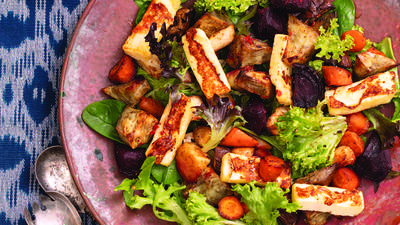
1. Be cautious. I hate to sound like the fire police, but these tips will save you a lot of discomfort, misadventure and possibly money:
Place the grill several feet away from the side of your house, deck floor and railing (take this from a woman who almost burned the canvas awnings of a neighbor's house)
Never grill in the garage, on a covered patio or porch with a deep overhang
Make sure the grill is stable and sits on a flat surface
Keep an eye on little ones and pets
Roll up your sleeves (and save that chic-but-billowing outfit for another time)
2. Use marinades to tenderize tougher (less expensive) pieces of meat, and use dry rubs to add flavor to meat that is already tender.
3. Reduce flare-ups: Trim excess fat from chops and steaks to no more than 1/4 inch. Grilling with the lid on also reduces flare-ups, cooking food faster and more evenly.
4. Make sure the surface is dry if cooking cuts of meat. You want the meat to sear, not steam.
5. Move meat around on the grill with a spatula, not a barbecue fork. Poking meat will cause the juices to escape. Resist the urge to press down with your spatula, especially when cooking hamburgers. They won't cook any faster and you'll squeeze out the flavorful juices.
6. Brush sauces and glazes that contain sweeteners on the food during the last 15 minutes or so of grilling to avoid burning.
7. Most vegetables can be cooked on a grill: Grill them quickly over direct medium to medium-high heat. Marinate or toss vegetables with seasonings and oil before cooking to boost flavor and prevent sticking to the grill grate. Some larger vegetables like eggplant, zucchini and summer squash, large carrots, and sweet and white potatoes can be cut into uniform lengthwise slices (about 1/4- to 1/2-inch thick) to increase the surface area exposed to the grill. Cut onions and bell peppers into wedges and place directly on the grate or thread onto skewers.
8. Wooden skewers can be found in most supermarkets in the housewares aisle. Don't be tempted to skip soaking skewers in water -- they will catch on fire. If you have metal skewers, they'll work too.
9. Use grilling times only as a guide. Keep an instant-read thermometer handy to check for doneness. There are variables like the thickness of the food you are cooking, whether the food is cold or at room temperature when it goes on the grill, and even the weather. Allow more time at high altitudes or on windy or cold days. Cook ground meats to an internal temperature of at least 160 degrees Fahrenheit.
10. Use clean tongs and spatulas to remove cooked food from the grill. Never place cooked food on the same platter you used to carry uncooked food to the grill.
Before you go...
Each week, The Splendid Table brings you stories that expand your world view, inspire you to try something new, and show how food connects us all. We rely on your generous support. For as little as $5 a month, you can have a lasting impact on The Splendid Table. And, when you donate, you’ll join a community of like-minded individuals who love good food, good conversation, and kitchen companionship. Show your love for The Splendid Table with a gift today.
Thank you for your support.
Donate today for as little as $5.00 a month. Your gift only takes a few minutes and has a lasting impact on The Splendid Table and you'll be welcomed into The Splendid Table Co-op.




